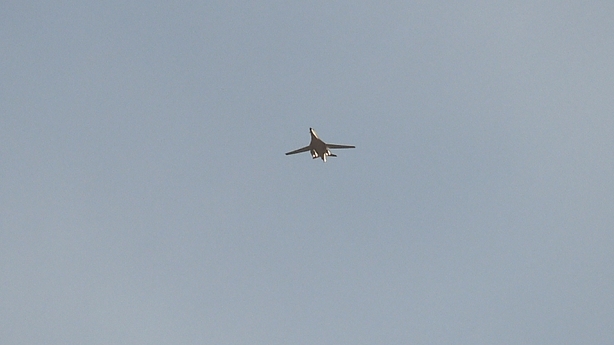The Islamic State group controls more than a third of the Syrian border town of Kobane, a monitoring group said.
IS militants have been fighting around the town against Kurdish forces backed by US-led air strikes for three weeks.
Head of the Syrian Observatory for Human Rights Rami Abdulrahman said the group is in control of all eastern areas, a small part of the northeast and an area in the southeast of the town.
This evening the US military's Central Command reported another nine bombing raids on IS fighters around the mostly Kurdish town, for a total of 14 strikes near Kobane.
The number of daily air strikes near the northern town jumped from five on Tuesday to 28 on Wednesday, according to Central Command, which runs the air war.
"We get them when we see them," said one military officer, who spoke on condition of anonymity.
"Opportunities for air strikes are presenting themselves in Kobane right now," the officer told AFP.
The commander of Kobane's heavily Kurdish defenders confirmed that the militants had made major gains in the three-week battle.
Earlier, US Central Command said indications were that Kurdish forces are "holding out" against IS militants.

"Indications are that Kurdish militia there continue to control most of the city and are holding out against ISIL (IS)," Central Command said in a statement.
The wording was unprecedented for Central Command, which until now has provided terse summaries of air strikes without offering assessments of particular battles or indicated where the IS group may be gaining or losing.
"US Central Command continues to monitor the situation in Kobane closely," it said.
United States Secretary of State John Kerry has said that while the advance of IS rebels on Kobane is a tragedy it will not deter the US and its allies from their long-term strategy in the region.
Rebels have seized more than a third of Kobani, advancingdespite U.S.-led air strikes as Turkish troops looked on but didnot engage.
"We are only a few weeks into building the coalition. Peopleare still receiving assignments," Kerry said. "The primary goalof this effort has been to provide the space for Iraq to be ableto get its government in place and to be begin to push back."
Kobane has become the centre of international attention with Kurdish leaders issuing desperate appeals, while the fighting has sent around 200,000 people flooding across the border into Turkey.
Demonstrations in Turkey, accusing the government there of failing to act to save the mostly Kurdish town, have triggered clashes in which at least 21 people were killed.
Turkey said it could not be expected to lead a ground operation against jihadists in Syria alone, amid growing pressure from the West to intervene militarily.
"It's not realistic to expect that Turkey will lead a ground operation on its own," Foreign Minister Mevlut Cavusoglu said at a news conference in Ankara this morning with visiting NATO Secretary General Jens Stoltenberg.
The latest strikes near Kobane destroyed five armed vehicles, an IS supply depot, a command centre, a logistics compound, and eight occupied barracks, US Central Command said.
Another air raid southwest of Raqqa destroyed four armed vehicles and damaged two more, it said.
US fighter jets and other aircraft kept up bombing runs in Iraq, with one attack northwest of Ramadi, one in Mosul and another raid south of Kirkuk, it said.
All aircraft "exited the strike areas safely," it added.
The Pentagon said earlier that air power alone could not save Kobane or possibly other towns under attack from IS in Syria and Iraq.
The militants could only be decisively defeated by "capable" local forces - moderate rebel fighters in Syria and Iraqi government troops and Kurdish forces, spokesman Rear Admiral John Kirby told reporters.
He said it would take time to train and arm forces that could fight effectively and work with US military advisers and aircraft.

